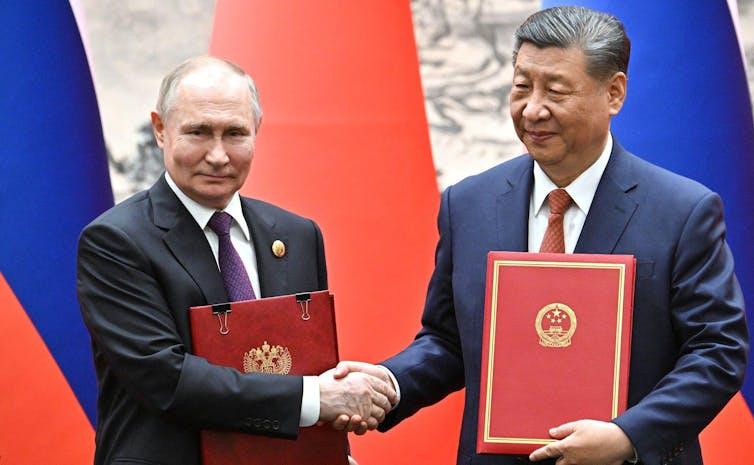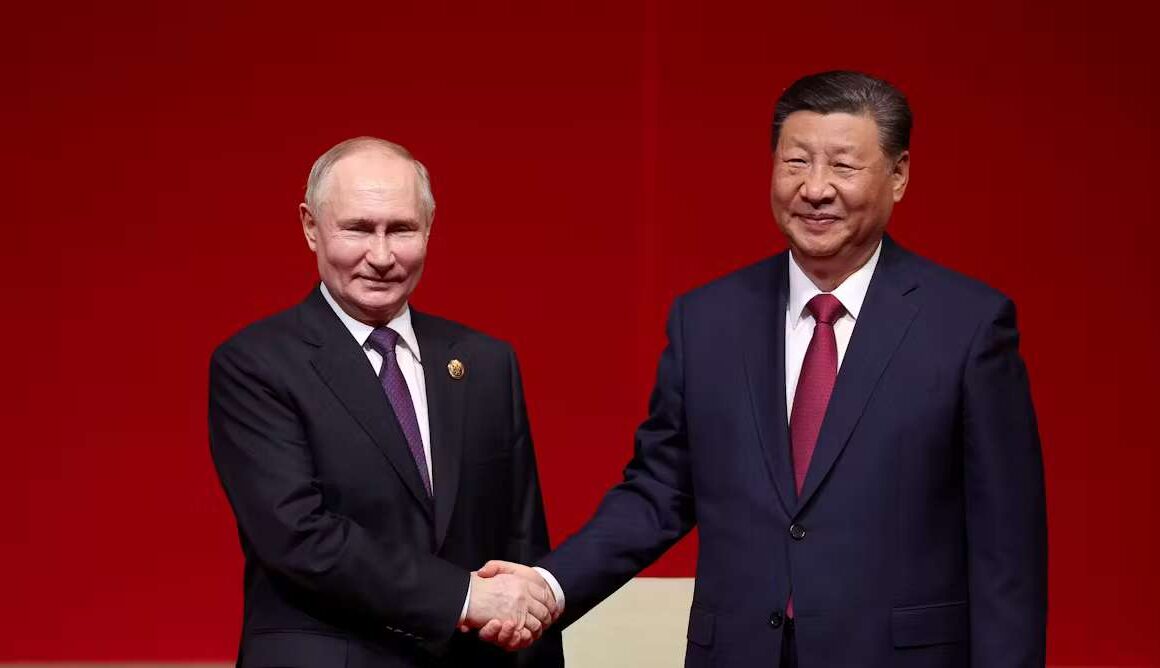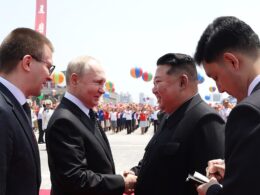Since Russia invaded Ukraine in 2022, the Chinese government has been criticised for its refusal to condemn the war. In 2024, the economic and diplomatic relationship between the two nations appears stronger than ever.
Because of strict censorship and repression imposed by the Chinese Communist Party (CCP), it is difficult to know the extent to which the general public shares their government’s support of Putin’s regime.
But a newly published study I carried out with colleagues found that more than 10% of Chinese people surveyed were willing to boycott Russian goods over the war in Ukraine.
The unexpected findings
This is a surprisingly large figure, especially since existing surveys indicate that Chinese people hold a broadly positive view of their neighbour. We used a representative sample of 3,029 Chinese citizens for this research, to dig into public attitudes to Russia. The survey was done in 2022 after the Ukraine invasion.
We were aware that due to widespread censorship, our participants might not be willing to give honest answers to questions about Russia’s actions in Ukraine.
They might also not feel safe to do that in a regime where disagreement with the CCP’s position is often met with harsh punishment. This is why we asked them to tell us if they would be willing to boycott Russian products currently sold in China.
We felt this question was a good indicator of how much the participants disapproved of Russian foreign policy in Ukraine. More importantly, we were also curious to find out whether Chinese citizens would be willing to take direct political action to punish Russia economically for its aggressive behaviour.
In our study, we split respondents into the three different ideological groups in China: “liberals”, who support the free market and oppose authoritarianism; “the new left”, who sympathise with the policies pursued in China under Mao Zedong; and “neo-authoritarians”, who believe the Russian-Ukrainian conflict is an extension of the rivalry between authoritarian China and the liberal United States. These groups were based on the main political beliefs in China.
Liberals believe that China should work with, rather than against, western democracies. They also place a high value on human rights and democratic freedoms. Because of their beliefs, they are likely to think that Russia’s actions against Ukraine were unprovoked, aggressive and disproportional.

Chinese and Russian economic and diplomatic relations seem closer than ever in 2024. American Photo Archive/Alamy
The new left and neo-authoritarians we surveyed were more supportive of Russian products. The new left see Russia as a close ally and believe that Nato’s expansion in eastern Europe was a form of aggression. Neo-authoritarians, on the other hand, believe that supporting Russia, an allied autocracy, is in China’s best interest.
The silent protest
Asking Chinese participants if they are willing to boycott Russian products might seem like a simple matter of consumer preferences. However, our study reveals a great deal about the way in which regular citizens can express controversial political beliefs in a repressive authoritarian regime.
Boycotting products of certain companies has long been studied in the West as a form of unconventional political action that helps people express their beliefs. However, in the West, boycotting certain products is simply one of many ways people are able to take political action.
In a country such as China, boycotting a Russian product might often be the only safe way to express disagreement with the country’s actions.
This is because citizens do not have to tell others they chose not to buy a product, and their actions are unlikely to attract the attention of the authorities.
A secret way to Russia's collapse
Since Russian goods are readily available to Chinese consumers and China is encouraging more Russian exports to reach its market, the Russian economy could be significantly affected by an organised boycott campaign in China.
The considerable level of support for a boycott expressed by some of our participants, as well as previous acts of solidarity with Ukraine in China, suggest that such a campaign could already be taking place in the country.
This could harm Russia because it regularly exports a number of different products such as meat, chocolate, tea and wine to China. These goods made up 5.1% of China’s total imports in 2023 – and this figure is likely to increase if Russia becomes more isolated from the West, and therefore more dependent on China for its trade.
While 5.1% of the Chinese market might seem like a low figure, China is home to over 1.4 billion people. In this context, even a small boycott could result in a serious loss to Russian companies.
Our research shows that Chinese citizens don’t always support the official position of the communist party. It also shows that many people there will express even the most unpopular political opinions – if they can find a safe way to do it.
Copyright: The Conversation. This article was published by The Conversation and has been republished by Euromaidan Press with permission.
Editor's note. The opinions expressed in our Opinion section belong to their authors. Euromaidan Press' editorial team may or may not share them.
Submit an opinion to Euromaidan Press





